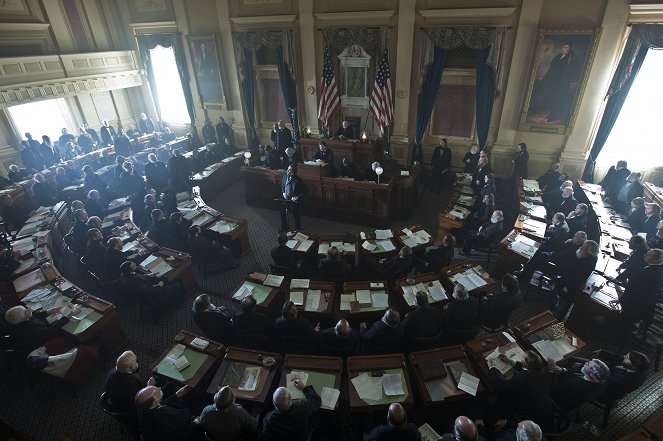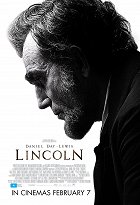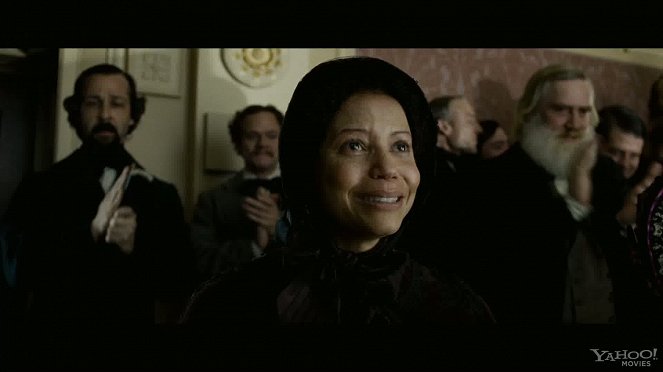Directed by:
Steven SpielbergScreenplay:
Tony KushnerCinematography:
Janusz KaminskiComposer:
John WilliamsCast:
Daniel Day-Lewis, Sally Field, Joseph Gordon-Levitt, Tommy Lee Jones, John Hawkes, Hal Holbrook, James Spader, Tim Blake Nelson, Bruce McGill, Joseph Cross (more)VOD (2)
Plots(1)
A revealing drama that focuses on the 16th President's tumultuous final months in office. In a nation divided by war and the strong winds of change, Lincoln pursues a course of action designed to end the war, unite the country and abolish slavery. With the moral courage and fierce determination to succeed, his choices during this critical moment will change the fate of generations to come. (20th Century Fox UK)
(more)Videos (56)
Reviews (14)
You are watching this historical borefest and keep thinking to yourself "where the hell did Spielberg's dynamism and fierceness in individual shots go, where’s the drive?". Lincoln is beautifully shot, solidly narrated with strong historical foundations, and Daniel Day-Lewis is once again captivating. However, films like this should be at least a little bit accessible to the audience, in other words, they must not be boring and tedious. Unfortunately, this was not the case here even in the slightest.
()
I had to force myself a little to look at Lincoln at all and I must say that it was worth watching. A myriad of great actors who have something to say... And Spielberg doesn’t make thoroughly bad movies at all and, although long-winded and boring, he makes the process of pushing through the 13th Amendment interesting. Abe (Daniel Day-Lewis is great and the Oscar nomination is more than justified) uses delay, corruption and twisting the truth to get his way. His kind and wonderfully pointed stories make him look like a nice guy, but because of this, the people have to suffer an extra month of war. A stellar moment in history they say... there’s nothing stellar about trying to get your own way and to succeed by scheming and half-truths. I should point out that during the final vote I had my fingers crossed that it would be passed and found myself with a wider and wider smile at each “Yay". Spielberg was successful in not presenting this period in history as being something ultra significant in creating history. He takes it raw, without emotion. And if it works, fine. And if not, at least they tried. Well it is a bit of a disadvantage that we know how it turns out. So it’s hard for the viewer to be fully satisfied. Excursions away from interiors (there are only a couple) where we see the war and what it involved (severed limbs in the wheelbarrow) take up just a couple of minutes of this lengthy movie. This is precisely the style (apart from the fact that the arguments have a head and tail to them) used when the Czech parliament sits (apart from the fact that in the movie someone is really sitting there and nobody is reading the newspaper or sleeping, in fact they actually speak and express their opinion) and I just can’t watch that for more than a few seconds. At least that Williams did the music, otherwise nothing special.
()
Griffith, Ford, Spielberg. Lincoln. Three great American directors and their respective versions of the Lincoln myth. Though Spielberg takes an honest and respectful approach to Lincoln’s personality, creating a cult and idealising a democratic idea is not as important to him as drawing the viewer into the narrative. Above all, this is a riveting political drama, with Abraham Lincoln as the protagonist. It is fascinating to watch how smoothly one of Spielberg’s least action-oriented and least epic films moves forward, how the individual scenes are knitted together, how the director works with the deadline (to get 20 votes by the end of January), how the personal storyline serves the work storyline. The film does not primarily set out to depict Lincoln as a messianic figure demonstrating helpfulness toward all human beings without distinction, and such deification, if it happens, never overshadows the central goal of pushing through the Thirteenth Amendment before the end of the Civil War. We may even have doubts about the “purity” of Lincoln’s relentless pursuit of justice in the face of the law – we are not led to adopt a clear position as actively as in Spielberg’s other socio-political films, e.g. through impassioned music. Furthermore, the narrative is slowed the most by Lincoln’s “Christ-like” tendency to sit down in front of a group of listeners and start telling them a story. Does this really prove to us that Lincoln is the father of the American nation, who could take the liberty of making jokes about George Washington, or have we entered the realm of political satire about an elderly gentleman who liked to talk at times when it was necessary to act? The father interpretation would clearly be more appropriate also for the repeated adoption of the younger son’s childish perspective (including a very clever narrative feint in the climax), but to me it particularly involved the highlighting of the lack of didacticism in Spielberg’s approach. With the flawlessly cast actors and very impressive images (the meaning-making lighting and placement of the characters, frontal shooting, when there is a reason for every movement), With Lincoln, Spielberg primarily constructed an intelligent drama that ceaselessly keeps us on our toes and requires constant linking of contexts. And only then did he create a myth. 90%
()
Big words, lofty speeches, and in a way, just one big Abraham Lincoln bon mot. Steven Spielberg adored this part of American history so much that he simply made a passage from a history textbook. The brief family passages reveal sparse fragments about the main character while the movie strives purely for annotation, peace, and political negotiation. No emotions, no enthusiasm. Just with perfectly crafted production and zero added value. And we all knew even before the first applause that Daniel Day-Lewis wouldn't just play Abraham, but he would completely become him. The disappointment is even greater now, since Steven has obviously filmed a(nother) magnum opus of his dreams and yet managed to entertain me only with some unbridled Tommy Lee Jones and, as expected, the scene of the actual voting itself. After seeing this, the slightly problematic War Horse now looks like a perfect period piece.
()
Academy borefest??!! Enslave me, but whoever said this just doesn't have much of a clue as to how far the genius of cinematic storytelling can stretch. Lincoln is a 150-minute long, mostly conversational treasure that, despite the knowledge of the historical outcome, literally engulfs the viewer without a single flinch or flicker of creative indiscretion. A story where there isn't a single scene or line that doesn't fundamentally shift the titular political line or unsentimentally deepen the personal and familial line, which is then logically reflected in the decisions and development of the former. I can't wait to watch it again (and again), to savour more attentively the balanced rhythm with which the lines alternate, overlap and complement each other, the witty interweaving of successive events or the ingenious transitions between scenes, which without exception fit together compositionally and continuously like a full stop at the end of a sentence. Not to mention the brilliant games with lighting and camera positions, the emotions that can only be evoked by the clever handling of editing and narrative direction, and finally the performances of absolutely everyone who appears in front of the camera. Lincoln convinced me of two things: that Abraham Lincoln was one of the greatest figures of the 19th century (even allowing for the undeniable glorification of the film, of course) and that Steven Spielberg is the greatest Hollywood director of all time.
()
Gallery (69)
Photo © Twentieth Century Fox Film Corporation / David James



Ads